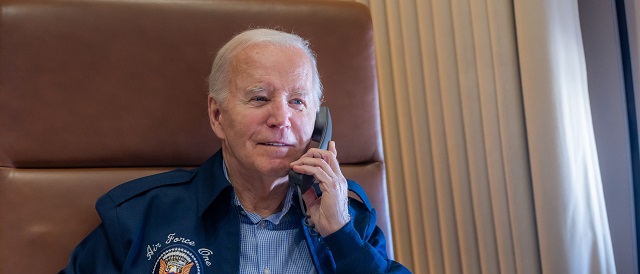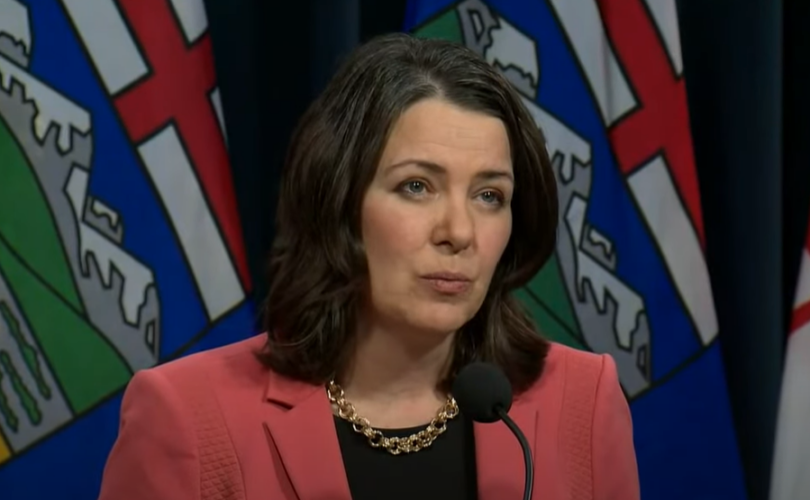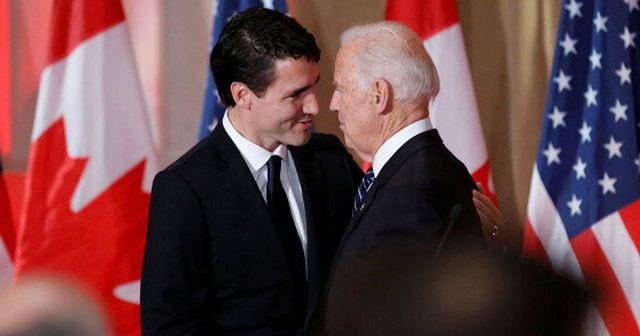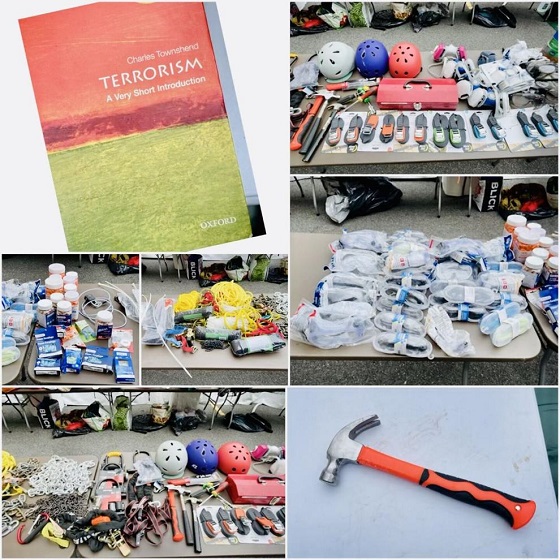Alberta
The first 100 days of Premier Kenney’s aggressive agenda to drive Alberta forward

In his own words the government of Premier Jason Kenney has hit the ground running. As the new provincial government hits it’s 100 Day Milestone Premier Kenney has released an update to Albertans touting the early accomplishments of his first mandate. The video below shows a government running at break-neck speed to accomplish its goals. Without further introduction, here’s a report from the province on the first 100 days of the Jason Kenney mandate.
Post Submitted by The Province of Alberta
Government charges ahead as it hits 100-day milestone
As it reaches its 100-day milestone, Alberta’s new government is keeping another promise by introducing a $10-million fund to stand up for Indigenous peoples’ prosperity.
The new Indigenous Litigation Fund means groups that include Indigenous people can now apply for a grant to help with legal matters when advancing Alberta’s energy and natural resource development interests.
“This fund is yet another component of our Fight Back Strategy to stand up against the foreign-funded special interests landlocking Alberta energy. Indigenous peoples who favour energy development are often left out of the conversation, and this fund will help defend their right to be consulted on major projects and ensure their voices are heard too.”
Funding can be used to support a variety of legal actions, including researching positions, developing motions, participating in trials and appeals, or intervening in processes and legal actions.
The litigation fund, along with the creation of the Alberta Indigenous Opportunities Corporation, is part of the government’s vision to help shape a better future for Indigenous people in Alberta.
The fund’s introduction is one of 68 commitments the Alberta government has met in its first 100 days. Out of 375 commitments, the Alberta government has already completed 58, and a further 10 are underway.
Backgrounder: Promises made, promises kept
In reaching its 100-day milestone, Alberta’s new government has focussed on jobs and the economy, standing up for Alberta and making life better for all Albertans.
Over the course of the summer, the province:
- Hosted and participated in important national meetings to bring the issues that matter most to Albertans to the forefront of the national agenda, including the:
- Western Premiers’ Conference, chaired by Premier Kenney, which led to shared support for national resource corridors to facilitate oil and gas pipelines and to improve interprovincial trade.
- Stampede Premiers’ meeting, where a coalition of Canadian jurisdictions met to discuss improving market access for Canadian products and creating jobs.
- Council of the Federation meeting in Saskatoon, where Premier Kenney took the bold step of unilaterally dropping all of Alberta’s procurement exceptions to the 2017 Canadian Free Trade Agreement, and secured support from 12 of 13 provinces and territories for resource corridors.
- Continued to fight alongside several provinces against the imposition of a federal carbon tax that would hinder economic growth and punish Albertans for living ordinary lives.
- Stood up to federal policies that are damaging Alberta’s economy with letters from several ministers to their respective federal counterparts. These letters reiterate Alberta’s positions and outline the actions that should be taken to support the province’s people, industries and economy.
Alberta has also made substantial progress on its Fight Back Strategy to defend the province’s oil and gas sector and economic interests against unfounded attacks:
- As part of its commitment to standing up for Alberta against foreign-funded efforts to landlock Alberta’s energy resources, government has launched a public inquiry into the defamatory campaigns to landlock Alberta oil.
- A team led by the award-winning oil and gas journalist Claudia Cattaneo will develop a strategic plan aimed at restoring Alberta’s reputation in the fight to support the oil and gas sector that brings private investment and jobs to the province.
Promises kept
The following commitments have been implemented in three priority areas:
Getting Albertans back to work:
| 1. Passed Bill 1, The Carbon Tax Repeal Act. | Introduced on May 22, 2019; received royal assent on June 4, 2019. |
| 2. Enacted the Job Creation Tax Cut to reduce the general tax rate on businesses to eight per cent from 12 per cent. | Introduced Bill 3, the Job Creation Tax Cut Act, on May 28, 2019; received royal assent on June 28, 2019. |
| 3. Appointed a Minister for Red Tape Reduction to implement the Red Tape Reduction Strategy. | Appointed Grant Hunter as the Associate Minister for Red Tape Reduction on April 30, 2019. |
| 4. Passed the Red Tape Reduction Act to cut the regulatory burden by one-third and the time required for regulatory decisions to be made. | Introduced Bill 4, the Red Tape Reduction Act, on May 29, 2019; received royal assent on June 28, 2019. |
| 5. Launched a Red Tape Challenge website to seek public input on cutting job-killing regulatory requirements. | Launched on June 24, 2019. |
| 6. Passed the Fair Registration Practices Act as part of the Fairness for Newcomers Action plan to ensure fair and fast assessment of immigrants’ professional credentials. | Introduced Bill 11, the Fair Registration Practices Act, on June 19, 2019; received royal assent on June 28, 2019. |
| 7. Introduced a Job Creation Student Wage to reduce youth unemployment. | Announced on May 27, 2019; took effect on June 26, 2019. |
| 8. Returned to a holiday-pay qualifying period of 30 workdays in the 12 months preceding a general holiday to help create new jobs. | Introduced Bill 2, An Act to Make Alberta Open for Business, on May 27, 2019; received royal assent on July 18, 2019. |
| 9. Reinstated the mandatory secret ballot for union certification votes to restore workplace democracy. | Introduced Bill 2, An Act to Make Alberta Open for Business, on May 27, 2019; received royal assent on July 18, 2019. |
| 10. Secured agreement from other provinces and territories to increase interprovincial mobility for apprentices and skilled tradespeople. | Premier Kenney advocated for this at the July 2019 gathering of Canada’s Premiers at the Council of the Federation and at the Western Premiers’ Conference on June 27, 2019.On July 26, 2019, Alberta signed a Memorandum of Understanding with Ontario to enhance opportunities in the skilled trades and expand the apprenticeship model by promoting clear learner pathways. |
| 11. Guaranteed in law that the royalty regime in place when a well is permitted will remain in place for that project to help restore investor confidence. | Introduced Bill 12, the Royalty Guarantee Act, on June 20, 2019; received royal assent on July 18, 2019. |
| 12. Reclassified service rigs as off-road vehicles to help the struggling energy service sector. | Came into force on June 28, 2019. |
| 13. Appointed an Associate Minister of Natural Gas to give dedicated political attention to the challenges facing Alberta gas producers. | Appointed Dale Nally as the Associate Minister of Natural Gas on April 30, 2019. |
| 14. Appointed an Associate Deputy Minister of Natural Gas in the Department of Energy. | Appointed David James as the Associate Deputy Minister of Natural Gas on April 30, 2019. |
| 15. Kept the small business tax rate at two per cent. | Announced on May 28, 2019. |
| 16. Launched consultation with farmers and ranchers on the Farm Freedom and Safety Act. | Launched on July 12, 2019. |
| 17. Consulted on whether Alberta should return to an energy-only market, leading to a decision that was widely applauded by producers and consumers. | Launched engagement; announced results on July 24, 2019. |
| 18. Formed industry panels to identify unnecessary red tape in every sector of Alberta’s economy. | Announced on Aug. 2, 2019. |
| 19. Fought for market access and the reduction of interprovincial trade barriers to create jobs and grow our economy. | Premier Kenney advocated for this at Council of the Federation in July 2019; Agriculture and Forestry Minister Devin Dreeshen advocated for this during the Federal, Provincial, and Territorial Minister of Agriculture meeting on July 19, 2019; Economic Development, Tourism and Trade Minister Tanya Fir sent a letter on July 31, 2019 to her federal counterpart. |
| 20. Put foreign credential recognition on the agenda of the First Ministers Meeting to push for faster action on the “Pan-American Framework for the Assessment and Recognition of Foreign Qualifications.” | This item was on the agendas of the Council of the Federation meeting in July 2019 and the Western Premiers’ Conference on June 27, 2019. |
Making life better for all Albertans:
| 21. Proclaimed the Education Act to modernize Alberta’s school system. | Introduced Bill 8, the Education Amendment Act, on June 5, 2019; received royal assent on July 18, 2019; comes into force on Sept. 1, 2019. |
| 22. Retained the general $15/hr minimum wage. | Retained |
| 23. Returned to a regular/irregular workday distinction for calculating holiday pay to give workers more flexibility. | Introduced Bill 2, An Act to Make Alberta Open for Business, on May 27, 2019; received royal assent on July 18, 2019. |
| 24. Reversed the change in 2018 that eliminated the option for workers and employers to develop straight-time banked hours arrangements to help create new jobs. | Introduced Bill 2, An Act to Make Alberta Open for Business, on May 27, 2019; received royal assent on July 18, 2019. |
| 25. Strengthened new provisions in the Labour Relations Code that have reduced the duplication of employment claims in multiple forums (such as labour relations, employment standards, arbitration and privacy). | Introduced Bill 2, An Act to Make Alberta Open for Business, on May 27, 2019; received royal assent on July 18, 2019. |
| 26. Retained recent labour law changes to new procedural powers given to the Labour Relations Board, Employment Standards, and labour arbitrators such as those that allow the focusing of complaints. | Retained |
| 27. Retained new procedures relating to the duty of fair representation (e.g. obligation of a union and its process to properly represent a union member). | Retained |
| 28. Retained the current essential services legislation. | Retained |
| 29. Retained new forms of leave adopted in recent legislation. | Retained |
| 30. Appointed an independent expert to determine why construction has not yet begun on the Springbank Dam. | Appointed lawyer Martin Ignasiak on May 3, 2019. |
| 31. Ensured all major economic development proposals continue to be subject to mandatory environmental impact assessments. | Being done. |
| 32. Respected the constitutional right to separate schools. | Introduced Bill 8, the Education Amendment Act, on June 5, 2019; received royal assent on July 18, 2019. |
| 33. Made tourism the responsibility of the Minister of Economic Development and Trade. | Announced on April 30, 2019. |
| 34. Ended costly subsidies for intermittent forms of power production. | Minister Savage communicated the conclusion of the program to Alberta Electric System Operator on June 10, 2019. |
| 35. Appointed an Associate Minister of Mental Health and Addictions. | Appointed Jason Luan as the Associate Minister of Mental Health and Addictions on April 30, 2019. |
| 36. Saved $640 million by cancelling the unnecessary ‘Superlab’ and the nationalization of laboratory services. | Announced on June 20, 2019. |
| 37. Amended the Municipal Government Act to allow municipalities to offer property tax incentives to attract investment and development. | Introduced Bill 7, the Municipal Government (Property Tax Incentives) Amendment Act, on June 4, 2019; received royal assent on June 28, 2019. |
| 38. Passed the Alberta Senate Election Act to hold elections for senatorial nominees in 2021. | Introduced Bill 13, the Alberta Senate Election Act, on June 26, 2019; received royal assent on July 18, 2019. |
| 39. Supported safe schools that protect students against discrimination and bullying with amendments to the Education Act. | Introduced Bill 8, the Education Amendment Act, on June 5, 2019; received royal assent on July 18, 2019. |
| 40. Maintained the most generous charitable tax credit of any province in Canada to encourage charitable giving. | Maintained |
| 41. Passed a motion allowing free votes for MLAs on everything not deemed a confidence vote or key platform commitment. | Motion passed during spring session 2019. |
| 42. Passed a motion requiring MLAs wanting to cross the floor to resign and seek a byelection. | Motion passed during spring session 2019. |
| 43. Amended Standing Orders of the Legislative Assembly to raise the bar of civility and decorum and to stop desk-thumping in the Legislative Assembly. | Standing Orders effective May 30, 2019. |
| 44. Relaxed regulations that required enclosed events like folk festivals to keep people having a drink within unreasonable narrow zones such as fenced-in beer gardens. | Announced on May 16, 2019. |
| 45. Created a $10-million litigation fund to support pro-resource development groups that include Indigenous groups. | Announced Aug. 7, 2019 |
| 46. Amended the Education Act to implement the Leadership Quality Standards. | Introduced Bill 8, the Education Amendment Act, on June 5, 2019; received royal assent on July 18, 2019. |
| 47. Facilitated the creation and operation of new charter schools by removing the cap in the Education Act. | Introduced Bill 8, the Education Amendment Act, on June 5, 2019; received royal assent on July 18, 2019. |
| 48. Advocated for a federal Indigenous consultation process that provides clear timelines and legal certainty for project proponents, consistent with the federal government’s constitutional obligations. | Indigenous Relations Minister Rick Wilson sent a letter to the federal ministers of Crown-Indigenous Relations and Northern Affairs, and Indigenous Services Canada on Aug. 6, 2019. |
| 49. Launched a performance review of Alberta Health Services. | Announced hiring of contractor to conduct review on July 18, 2019. |
Standing up for Alberta:
| 50. Proclaimed Bill 12, Preserving Canada’s Economic Prosperity Act to defend Alberta’s vital economic interests. | Announced May 1, 2019. |
| 51. Challenged the constitutionality of the federal carbon tax by filing a judicial reference, and supported similar challenges by Saskatchewan and Ontario. | Announced Aug. 2, 2019. |
| 52. Launched a public inquiry into foreign sources of funds behind the anti-Alberta energy campaign, headed by Commissioner Steve Allen. | Announced July 4, 2019. |
| 53. Asked the Alberta energy industry to significantly increase its advocacy efforts. | Announced June 7, 2019. |
| 54. Held a summer session of the legislature. | Session ran from May 21 to July 5, 2019. |
| 55. Appointed the MacKinnon panel – an independent blue-ribbon group of experts to conduct a deep dive into Alberta’s fiscal situation. | Announced May 7, 2019. |
| 56. Lobbied for reforms to Canada’s Employment Insurance program so that Albertans who lose their jobs are treated more fairly by the system. | Labour and Immigration Minister Jason Copping sent a letter to the federal minister of Families, Children and Social Development on Aug. 7, 2019. |
| 57. Led by example by reducing Premier’s salary by 10 per cent and MLAs’ salaries by five per cent. | Announced Aug. 6, 2019. |
| 58. Building an interprovincial coalition which supports jobs, pipelines and the energy industry as evidenced by the Stampede Premiers’ Meeting, the joint letter opposing Bill C-69, and communiques from the Western Premiers’ Conference and Council of the Federation. | Recent activities include Western Premiers’ Conference and Stampede Premiers’ meeting. |
The following commitments are also well underway:
| 59. Using the persuasive power of the Premier’s “bully pulpit” to tell the truth in both official languages across Canada and around the world about how Albertans produce energy with the world’s highest environmental, human rights, and labour standards. | Ongoing via social media, speeches, statements, etc. |
| 60. Consulting on an Alberta version of Clare’s Law, which ensures Albertans at risk have fuller awareness of an intimate partner’s history of domestic violence. | Initial engagement sessions were held in Calgary and Edmonton in July 2019. |
| 61. Reversing the plan to spend $3.7 billion leasing rail cars. | Announced on June 27, 2019. |
| 62. Minimizing the red tape burden on farmers and ranchers. | Several actions announced at Cut Red Tape. |
| 63. Reversing four years of reductions in the fight against the mountain pine beetle by increasing funding by $5 million to $30 million annually. | Agriculture and Forestry Minister Devin Dreeshen sent a letter on July 5, 2019 to the federal ministers of Natural Resources, Environment, and Public Safety, requesting federal funding. |
| 64. Supporting the recommendation of the Canadian Artists’ Representation to have Parliament amend the Copyright Act to require that a five per cent royalty be paid to visual artists on the resale of their work. | Culture, Multiculturalism and Status of Women Minister Leela Aheer discussed this in a meeting with the federal minister of Canadian Heritage and Multiculturalism during the June 2019 meeting of federal, provincial and territorial ministers responsible for culture and heritage. |
| 65. Reviewing the Connect Care contract and My Health Care Records to reduce potential duplication of services and ensure maximum effectiveness. | Issued an RFP on July 12, 2019. |
| 66. Maintaining existing GoA capital plan for 2019-20 through 2022-23. | Ongoing support for capital projects including sending endorsement letters to the federal government in support of projects that qualify for funding from the federal Investing in Canada Infrastructure Program. |
| 67. Requiring all universities and colleges to develop, post and comply with free speech policies that conform to the University of Chicago Statement on Principles of Free Expression. | Announced ongoing work with universities and colleges on July 29, 2019. |
| 68. Seeking exemption from Canada Mortgage and Housing Corporation (CMHC) stress tests. | Premier Kenney raised this in meetings with Prime Minister Trudeau and the federal minister of Finance in Ottawa on May 2, 2019. |
Alberta
Canadian Christian chiropractor fights ‘illegal’ $65,000 fine for refusing to wear mask

From LifeSiteNews
Dr. Curtis Wall went against the College of Chiropractors of Alberta’s COVID mask mandate in 2020 and the organization has been pursuing disciplinary action ever since.
The legal team for Dr. Curtis Wall, a Canadian chiropractor who was recently fined $65,000 by his medical college for not wearing a mask in 2020 despite the fact public health orders last year were nullified by a court, has vowed to fight the “illegal” fine, saying that Wall was targeted because he is a “Christian man of integrity and principle.”
“Dr. Wall should not pay any fines or costs when the public health orders he was charged with not following have been declared void by the courts,” said Wall’s legal team, Liberty Coalition Canada (LCC), in a press release.
“He is a Christian man of integrity and principle — attributes that make him a target for government overreach in the era of COVID.”
Wall was practicing in Calgary in 2020 when the COVID crisis was gearing up, went against Alberta’s public health orders and chose not to wear a mask during patient visits. Many of his patients also decided to not wear masks during their visits, which quickly drew the ire of College of Chiropractors of Alberta, which had mandated that all chiropractors wear masks.
Wall, who has been seeing patients for the last 25 years with a pristine record, was then targeted by the College, which tried to strip him of his license to practice. The College was unable to strip Wall of his license and he continued to practice, sans mask in 2021 and 2022.
In 2021, the College had brought against Wall, as per the LCC, “a long list of charges of unprofessional conduct against Dr. Wall, most of which related to Dr. Wall not wearing a mask while treating patients and permitting his patients to not wear a mask.”
Wall was then brought before a disciplinary hearing Tribunal to mediate his case, which went well into 2022, and had placed a publication ban on all “identities of all witnesses,” including Wall’s.
James Kitchen, Wall’s lawyer from the LCC, was successful in getting the publication ban lifted, as the LCC noted due to the College “wishing to avoid likely defeat before the courts” regarding keeping the ban in place.
Fined chiropractor says college did not recognize his ‘Christian convictions’
In 2023, the Tribunal ruled against Wall entirely and in favor of the College.
The Tribunal’s decision noted the LCC is “riddled with errors of fact and law and is so poorly decided it is an embarrassment to the chiropractic profession.”
Wall spoke with LifeSiteNews and observed that while in his point of view he does not feel his fines and costs imposed on him by the college “are a direct result of my Christian faith,” he did note that the tribunal did “not recognize my honest Christian convictions as a valid reason for my not wearing a mask.”
“They put placed no merit in the argument that as a Christian I believe I am created in the image of God,” Wall said.
“My face is an expression of Him. Having man arbitrarily mandate that I cover my face is an affront to that expression and signifies that I am living in the fear of man, not by faith. So, in all, I don’t feel directly persecuted as a Christian, but certainly indirectly.”
Wall told LifeSiteNews that in his opinion the college could have “handled this issue much differently.”
“There must always be room for exceptions to a rule. I did present a doctor’s note to verify my inability to wear a mask. They did not place any weight on that note. They blamed me for ‘self-diagnosing’ my problem,” Wall said.
“Number one, I’m a doctor. I think eight years of schooling has given me some wisdom to diagnose my own signs and symptoms. Number two, if someone eats a peanut and their throat swells shut, can they not diagnose themselves and stay away from nuts? It’s not a problem to self-diagnose.”
Wall said that despite his legal team presenting four expert witnesses to demonstrate “the obvious inadequacy and lack of efficacy in mask-wearing, not to mention the harms as well,” the college “did not cite the record once in their verdict.”
He noted that “common sense, science and past and present studies overwhelmingly demonstrate” the lack of efficacy regarding mask-wearing.
The LCC noted that although both Kitchen and Wall hoped for an “unbiased decision from the tribunal,” they knew it was more “likely the tribunal members would lack the courage to oppose the government’s COVID narrative by accepting the scientific evidence masks are utterly ineffective at preventing the transmission of COVID and harmful to wearers.”
“Nonetheless, it is shocking the lengths the tribunal went to dismiss the evidence of Dr. Wall, three of his patients, and his four expert witnesses while blithely accepting all the evidence of the College.”
Wall’s charges laid despite a recent court ruling nullifying all Alberta COVID health orders
According to LCC, the charges brought against Wall show that the College of Chiropractors of Alberta has “ignored the law” relating to non-criminal COVID-era charges handed out in the province.
As reported by LifeSiteNews before, last year a judge from Alberta ruled that politicians violated the province’s health act by making decisions regarding COVID mandates without authorization. This ruling came from the Alberta’s Court of Kings Bench’s Ingram v. Alberta decision, which put into doubt all cases involving those facing non-criminal COVID-related charges in the province. In effect, the ruling struck down and nullified all health orders issued by Dr. Deena Hinshaw, Alberta’s former chief medical officer of health.
As a result, multiple people facing charges, such as Dr. Michal Princ, pizzeria owner Jesse Johnson, café owner Chris Scott, and Alberta pastors James Coates, Tim Stephens, and Artur Pawlowski who were jailed for keeping churches open under then-Premier Jason Kenney, have had COVID charges against them dropped due to the court ruling.
The Alberta’s Court of Kings Bench’s Ingram v. Alberta decision put into doubt all cases involving those facing non-criminal COVID-related charges in the province.
As a result of the court ruling, Alberta Crown Prosecutions Service (ACPS) said Albertans facing COVID-related charges will likely not be convicted but instead have their charges stayed.
However, last year, the College, and of important note after the Ingram ruling, ordered Wall to pay $65,000 in fines and costs “under threat of immediately losing his license to practice if he does not pay,” the LCC said.
Chiropractor’s lawyer to fight fine tooth and nail
According to the LCC, the College’s new complaints director said she will enforce the tribunal’s court-defying order and mandate Wall pay the $65,000.
Because of this, Kitchen submitted an application to the College “to prevent this injustice” against Wall, the LCC noted.
“The Application will be heard on June 21. It will be heard virtually and is open to public, although the College has erected a number of barriers to people attending its hearings. For one, people must register with the hearings director and must do so many days in advance,” he told LifeSiteNews.
“The Tribunal elected to ignore the Ingram decision despite issuing its decision over two weeks after Ingram was released by the Court.”
Kitchen noted that the Tribunal had a lawyer advising it who was being paid some $700 an hour. He told LifeSiteNews that “Tribunals can do whatever they want and often do.”
“Only if the affected person takes further legal action can they hold the Tribunals accountable. And even then, that’s very difficult because the first appeals are to the councils of the Colleges, which almost always rubber stamp whatever the Tribunals decide. Real accountability isn’t had until the impugned professional is able to reach the Court of Appeal, which of course takes years and an enormous amount of funding for lawyer fees,” Kitchen said.
Kitchen is working Wall’s case at discounted rates and noted that high legal costs in such cases dealing with tribunals, who can drag things on for years, to him appear to be a tactic the Colleges count on for “avoiding accountability.”
The LCC estimates the College, which is funded through payments from all chiropractors, paid some $600,000 in legal fees to fight Wall.
“LCC asks supporters to donate toward Dr. Wall’s case so he and Mr. Kitchen can hold the College of Chiropractors of Alberta accountable and bring an end to the unjust persecution of Dr. Curtis Wall. Liberty Coalition Canada is assisting Dr. Wall with his legal expenses through the Legal Defense Fund.”
Kenney quit after losing the confidence of his United Conservative Party (UCP) members for backtracking on his promise to not impose a COVID vaccine passport. Under Kenney, thousands of businesses, notably restaurants and small shops, were negatively impacted by severe COVID restrictions, mostly in 2020-21, that forced them to close their doors for a time. Many never reopened. At the same time, as in the rest of Canada, big box stores were allowed to operate unimpeded.
Under Kenney, thousands of nurses, doctors, healthcare and government workers lost their jobs for choosing to not get the jabs, leading Premier Danielle Smith to say – only minutes after being sworn in – that over the past year the “unvaccinated” were the “most discriminated against” people in her lifetime.
Recently, LifeSiteNews reported on how Alberta-based Rath & Company is in the process of putting together a class-action lawsuit against the Alberta government on behalf of many business owners in the province who faced massive losses or permanent closures from what it says were “illegal” COVID public health orders enacted by provincial officials.
Alberta
Game changer: Trans Mountain pipeline expansion complete and starting to flow Canada’s oil to the world

Workers complete the “golden weld” of the Trans Mountain pipeline expansion on April 11, 2024 in the Fraser Valley between Hope and Chilliwack, B.C. The project saw mechanical completion on April 30, 2024. Photo courtesy Trans Mountain Corporation
From the Canadian Energy Centre
By Will Gibson
‘We’re going to be moving into a market where buyers are going to be competing to buy Canadian oil’
It is a game changer for Canada that will have ripple effects around the world.
The Trans Mountain pipeline expansion is now complete. And for the first time, global customers can access large volumes of Canadian oil, with the benefits flowing to Canada’s economy and Indigenous communities.
“We’re going to be moving into a market where buyers are going to be competing to buy Canadian oil,” BMO Capital Markets director Randy Ollenberger said recently, adding this is expected to result in a better price for Canadian oil relative to other global benchmarks.
The long-awaited expansion nearly triples capacity on the Trans Mountain system from Edmonton to the West Coast to approximately 890,000 barrels per day. Customers for the first shipments include refiners in China, California and India, according to media reports.
Shippers include all six members of the Pathways Alliance, a group of companies representing 95 per cent of oil sands production that together plan to reduce emissions from operations by 22 megatonnes by 2030 on the way to net zero by 2050.
The first tanker shipment from Trans Mountain’s expanded Westridge Marine Terminal is expected later in May.
 Photo courtesy Trans Mountain Corporation
Photo courtesy Trans Mountain Corporation
The new capacity on the Trans Mountain system comes as demand for Canadian oil from markets outside the United States is on the rise.
According to the Canada Energy Regulator, exports to destinations beyond the U.S. have averaged a record 267,000 barrels per day so far this year, up from about 130,000 barrels per day in 2020 and 33,000 barrels per day in 2017.
“Oil demand globally continues to go up,” said Phil Skolnick, New York-based oil market analyst with Eight Capital.
“Both India and China are looking to add millions of barrels a day of refining capacity through 2030.”
In India, refining demand will increase mainly for so-called medium and heavy oil like what is produced in Canada, he said.
“That’s where TMX is the opportunity for Canada, because that’s the route to get to India.”
Led by India and China, oil demand in the Asia-Pacific region is projected to increase from 36 million barrels per day in 2022 to 52 million barrels per day in 2050, according to the U.S. Energy Information Administration.
More oil coming from Canada will shake up markets for similar world oil streams including from Russia, Ecuador, and Iraq, according to analysts with Rystad Energy and Argus Media.
Expanded exports are expected to improve pricing for Canadian heavy oil, which “have been depressed for many years” in part due to pipeline shortages, according to TD Economics.
 Photo courtesy Trans Mountain Corporation
Photo courtesy Trans Mountain Corporation
In recent years, the price for oil benchmark Western Canadian Select (WCS) has hovered between $18-$20 lower than West Texas Intermediate (WTI) “to reflect these hurdles,” analyst Marc Ercolao wrote in March.
“That spread should narrow as a result of the Trans Mountain completion,” he wrote.
“Looking forward, WCS prices could conservatively close the spread by $3–4/barrel later this year, which will incentivize production and support industry profitability.”
Canada’s Parliamentary Budget Office has said that an increase of US$5 per barrel for Canadian heavy oil would add $6 billion to Canada’s economy over the course of one year.
The Trans Mountain Expansion will leave a lasting economic legacy, according to an impact assessment conducted by Ernst & Young in March 2023.
In addition to $4.9 billion in contracts with Indigenous businesses during construction, the project leaves behind more than $650 million in benefit agreements and $1.2 billion in skills training with Indigenous communities.
Ernst & Young found that between 2024 and 2043, the expanded Trans Mountain system will pay $3.7 billion in wages, generate $9.2 billion in GDP, and pay $2.8 billion in government taxes.
-

 Energy1 day ago
Energy1 day agoU.S. EPA Unveils Carbon Dioxide Regulations That Could End Coal and Natural Gas Power Generation
-

 John Stossel1 day ago
John Stossel1 day agoThe Swamp Survived: Why Trump Failed to “Drain the Swamp”
-

 Alberta2 days ago
Alberta2 days agoCanadian Christian chiropractor fights ‘illegal’ $65,000 fine for refusing to wear mask
-

 COVID-191 day ago
COVID-191 day agoCOVID Is Over — But Did We Learn Anything From It?
-

 Environment1 day ago
Environment1 day agoScientific Report Pours Cold Water On Major Talking Point Of Climate Activists
-

 conflict1 day ago
conflict1 day agoAmerica Is Really Bad At Foreign Interventions. Why Does Biden Think Ukraine Will Be Any Different?
-

 Opinion19 hours ago
Opinion19 hours agoBoy Scouts of America changes name to ‘Scouting America’ to be ‘more inclusive’
-

 Media2 days ago
Media2 days agoCBC tries to hide senior executive bonuses








